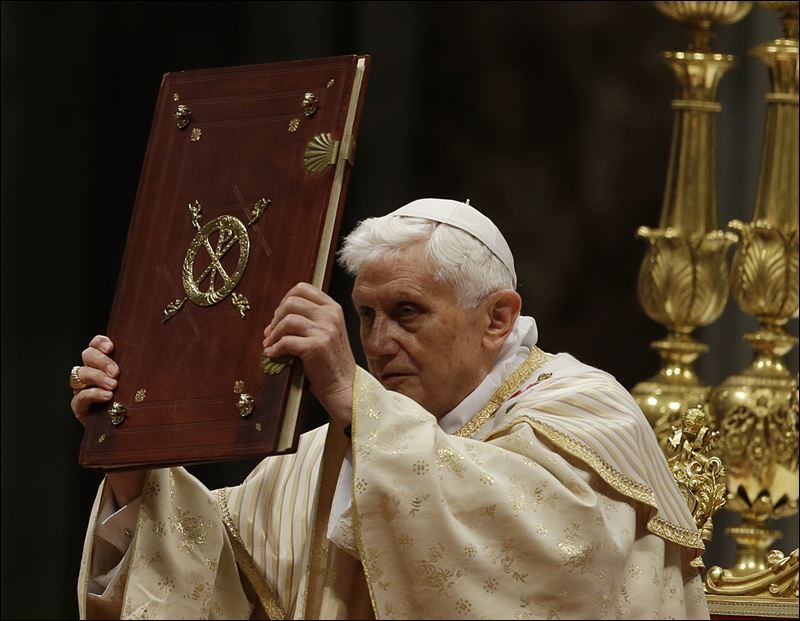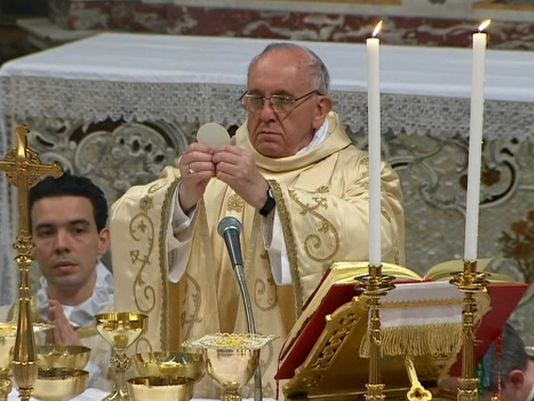The social media seems to be teeming with images and comments comparing Pope Francis and Pope Emeritus Benedict XVI. Some of the comments question Benedict's humility in his use of beautiful vestments and the ornate papal throne. Sadly, even one of the princes of the Church has taken to Twitter to register his disdain for Benedict's use of beauty.
Today's Gospel account taken from St. John reminds me of what has been unfolding before us these past 12 days.
“Mary therefore took a pound of ointment of right spikenard, of great price, and anointed the feet of Jesus, and wiped his feet with her hair; and the house was filled with the odour of the ointment. Then one of his disciples, Judas Iscariot, he that was about to betray him, said: Why was not this ointment sold for three hundred pence, and given to the poor? Now he said this, not because he cared for the poor; but because he was a thief, and having the purse, carried the things that were put therein. Jesus therefore said: Let her alone, that she may keep it against the day of my burial. For the poor you have always with you; but me you have not always.”The first commandment is that we love God. Loving God means giving to him our best, especially when we render to him worship that is befitting to His Divine Majesty. When the Lord dictated to Moses just how He was to be worshipped, the Father gave very specific instructions and parameters, right down to the gold, silver, silk and cedar that was to be used.
We tend to have the mistaken notion that Jesus pretty much set aside all of the beauty of the Temple and the sacred rituals of Ancient Israel. However, such a notion appears to be ignorant of Sacred Scripture. All of Ancient Israel's sacrificial cultic practices in worship of the Lord find their fulfillment in Jesus. God used the beauty of the Temple, the grandeur of the priestly vestments and the precious materials to elevate the heart.
Jesus understood the deeper significance of what Mary of Bethany had done when she anointed His feet with the expensive oil and them dried them with her hair. She spared no expense in demonstrating her deep love for Jesus. He had restored her beloved brother Lazarus and had shown her the depths of His boundless mercy. She wanted to give Jesus her best. When we love someone, we spare no expense.
What then, are we to make of the approach that the man who served as the Vicar of Christ on Earth had taken during liturgy and during his particular exercise of the Petrine ministry? St. Augustine of Hippo noted that beauty wounds the heart wonderfully. There is something about beauty that pierces the soul and fills us with such wonder. Sublime beauty attracts us and elevates our hearts and minds to the beloved. It attracts us with such a gravitational pull that we cannot resist.
Such beauty also compels us to want to give that beauty back in return to the beloved. In his short story, "The Gift of the Magi" O' Henry captures this notion rather exquisitely. The young husband sells his most precious possession so that his beautiful wife can have a precious comb while the bride sells her hair so that her beloved can have a gift that expresses the profoundness of her love. Each parts with that which is most valuable out of love for the other. Mary parted with a considerable sum of money for the spikenard, not counting the cost nor worrying about the expense. For her, the sacrifice was made out of love and even at that, she did not believe it enough to give to Jesus.
Judas, on the other hand, bullies his way onto the scene. "Why this waste," he brazenly asks, "when this money could have been given to the poor?" His Eminence Roger Cardinal Mahony seems to make that same remark in his repeated condescending tweets about Benedict. Sadly, even my fellow Catholics echo that same sentiment when they try to pit Benedict against Pope Francis. They just do not get it.
Jesus tells Judas and he tells us, "The poor you will always have with you, but you will not have me." We cannot love the poor if we do not first love Christ. If the arrow of beauty does not pierce us and lead us to love of God, how then can we love the poor?
The vesture that Benedict used for the Mass, the gold finery of the candlesticks, the jewel encrusted chalices and ciborria, the gilded Book of the Gospels, the ornate Papal throne, the red shoes and the magnificent pastoral staff point to the dignity and solemnity of the liturgy being celebrated. As the Universal Pastor, the Holy Father offers the Holy Sacrifice of the Mass to God, making supplication for us, his flock. When the high priest of the Old Covenant offered the sacrifice to God on behalf of the faithful, he wore ornate vestments because he was offering worship to the Lord. In fact, every detail of the vesture was dictated to Moses by God, Himself. If God demanded the best when He was worshipped during the sacrifices of the Old Covenant, should we not do the same for Him in the New Covenant?
Mother Theresa certainly recognized that. She was cruelly criticized for spending the proceeds of her Nobel Peace Prize on a golden tabernacle for the Blessed Sacrament instead of tending to the poor. She believed that the Lord deserved the best, for her missionary work was deeply rooted in loving Christ first.
To wear the sacred, beautiful vestments for Mass is not a sign of arrogance nor is it a repudiation of humility. To wear the gold, the silver, the silk and the lace shows that we recognize that we are in the presence of a King, a Crucified King who did not spare any expense in His love for us.






